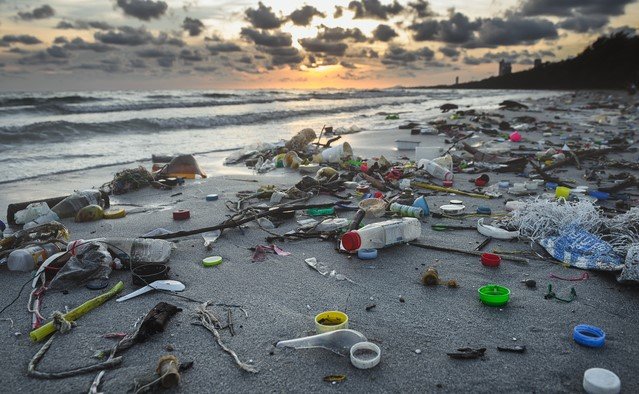With 370 unresolved clauses and tempers simmering, negotiators face pressure to salvage the historic pact to end plastic pollution
Over 190 countries are back at the table in Geneva, where the stakes couldn’t be higher. The world’s first-ever legally binding treaty to tackle plastic pollution is hanging in the balance. After a bitter fallout in Busan last year, diplomats now have just two weeks to salvage what’s left of the deal.
The mood? Tense. The disagreements? Deep. But the clock is ticking, and plastic is still piling up — from our landfills to the ocean floor.
A deadlock carried from Busan
Back in December, negotiators in Busan, South Korea had walked away empty-handed. Hopes were high, but the draft treaty quickly turned into a minefield of disputes.
At the heart of the drama were three explosive issues:
-
Whether to limit global plastic production.
-
What to do about toxic chemicals used in manufacturing.
-
How to phase out single-use plastics and other harmful products.
The current draft text is riddled with 370 brackets — each representing a chunk of language that countries just couldn’t agree on. That’s not just bureaucratic filler. It’s a sign of gridlock.
And Geneva isn’t starting fresh. All those unresolved bits are now back on the table, with just 14 days to hammer things out.

The oil and gas elephant in the room
Plastic is not just a waste problem — it’s an energy one. Most plastics start as fossil fuels, and countries with major oil and gas interests aren’t too keen on curbing production.
Big players like the U.S., Saudi Arabia, and China have pushed back against proposals to cap polymer production — the raw ingredient for plastic. They argue it’ll hurt industries and economies still dependent on petrochemicals.
Others, especially small island nations and EU members, say enough is enough.
They want:
-
Mandatory targets to slash plastic production
-
A phase-out of non-essential plastic items
-
Strong rules to cut emissions across the plastic lifecycle
The divide here isn’t just political. It’s philosophical.
Recycling isn’t the hero it’s made out to be
One thing most negotiators agree on? Recycling won’t save us.
Less than 10% of global plastic waste is actually recycled, according to OECD estimates. The rest is burned, buried, or dumped — often in poorer countries that never made the mess to begin with.
A few hard facts:
| Plastic Waste (2024) | Quantity |
|---|---|
| Total produced | 460 million tonnes |
| Properly recycled | ~43 million tonnes |
| Landfilled or incinerated | 300+ million tonnes |
| Ocean leakage | 11 million tonnes |
Even the most optimistic forecasts show recycling will barely dent the mountain of plastic that’s growing every year.
That’s why countries like Rwanda and Norway want the treaty to curb production at the source, not just fiddle with waste at the end.
The tricky business of chemicals and additives
Here’s something that doesn’t get enough attention — the toxic stuff inside plastic.
Plastic isn’t just one thing. It’s thousands of formulations, laced with additives, stabilizers, flame retardants, and colorants. Many of these are hazardous. Some are even linked to cancers, reproductive harm, and neurological damage.
But calling them out by name? Politically risky.
Negotiators are stuck on how to define and regulate these chemicals. Some countries want a “white list” approach — only allow safe additives. Others say the science isn’t settled, and fear trade disruptions.
This issue has bogged down the treaty more than anyone expected.
One delegate, speaking anonymously, said, “We can’t agree on what a harmful chemical even is, let alone ban it.”
Who’s pulling the strings?
Let’s not pretend this is a level playing field. There’s big money behind plastic.
Industry lobbyists have flooded these negotiations. According to a 2024 report by the Center for International Environmental Law, more than 140 fossil fuel and chemical industry reps were accredited to attend treaty talks last year.
That’s more than some country delegations.
Critics argue that these insiders are quietly shaping the draft — softening language, stalling timelines, and keeping production caps vague.
In contrast, grassroots groups and communities most affected by plastic pollution often don’t even make it into the room.
The treaty’s fate could hinge on one word: Binding
Language matters. And in this treaty, the difference between “should” and “shall” could decide the planet’s future.
Countries are deeply divided over whether the treaty should be legally binding. Some want strong enforcement mechanisms, penalties for non-compliance, and global oversight. Others — notably the U.S. — prefer voluntary commitments.
That disagreement has made its way into nearly every article of the draft.
Some negotiators fear that without binding teeth, the treaty will become just another feel-good resolution that no one takes seriously.
A delegate from the Maldives said, “We don’t need another promise. We need action. Real, enforceable action.”
What happens if Geneva fails?
Nobody wants to talk about failure, but it’s looming large.
If the talks collapse again, it could delay meaningful action on plastic pollution for years. Meanwhile, the world’s oceans are on track to hold more plastic than fish by 2050 — a projection no one wants to see come true.
Geneva is the final scheduled meeting before the treaty is supposed to be adopted at the end of 2025. If this round fails, diplomats will need to extend the negotiating timeline, risking loss of momentum — and public faith.
One tired observer put it bluntly: “We can’t recycle our way out of this. And we can’t negotiate forever.”
